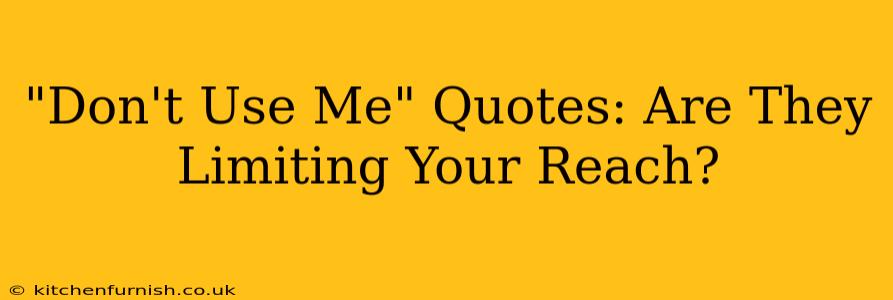The phrase "Don't use me" might seem harmless, even a bit quirky. But when plastered across your creative work – be it photography, writing, art, or music – it could be subtly sabotaging your efforts to connect with a wider audience. This seemingly innocuous statement can inadvertently restrict your reach and limit the potential impact of your creations. This article explores why these kinds of restrictive statements might be detrimental and what you can do instead.
Why "Don't Use Me" Quotes Can Be Detrimental
The core issue with "Don't use me" quotes lies in their inherent contradiction. You've created something, poured your time and effort into it, and yet you're actively discouraging its use. This sends mixed signals, undermining your own creative aspirations. Let's break down the potential drawbacks:
- Missed Opportunities: Your work might be perfect for someone's project – a blog post, a website, a video, or even a commercial. By forbidding its use, you're effectively shutting down opportunities for exposure and collaboration.
- Limited Engagement: The internet thrives on sharing. When you actively discourage sharing, you are significantly limiting the potential for your work to reach a broader audience and spark conversations. This prevents viral growth and organic promotion.
- Missed Licensing Opportunities: Many creators unknowingly miss out on potential income by preventing the use of their work. While you might not want your work used in certain contexts, establishing clear licensing terms could provide you with revenue streams and legal protection.
- Damaging to Your Brand: A restrictive approach may portray you as inflexible or unapproachable, potentially damaging your professional image and relationships with potential collaborators.
What About Copyright and Intellectual Property?
This leads to a crucial point: Copyright protection already exists to safeguard your creative work. You automatically own the copyright to your original creations. A "Don't use me" statement doesn't add any extra legal protection; it just prevents potential users from even inquiring about licensing. Consider implementing a clear licensing policy instead.
How to Handle Usage Rights Effectively
Instead of a blanket "Don't use me" statement, consider these alternatives:
- Clear Licensing: Define how your work can be used, with clear terms and conditions. This could include options for free use with attribution, paid licensing for commercial projects, or stipulations against specific types of usage. Creative Commons licenses offer a standardized way to achieve this.
- Attribution Requirements: If you allow free use, stipulate that you want credit for your work. This helps build your reputation and brand awareness.
- Contact Information: Provide an email address or contact form so potential users can ask you about licensing or usage permissions.
- Watermark Strategically: A watermark can deter unauthorized use without completely shutting down possibilities.
- Specific Restrictions: Instead of a general prohibition, specify contexts where you don't want your work used (e.g., hate speech, political campaigns, etc.).
FAQs about "Don't Use Me" Quotes
Is it illegal to use someone's work even if they say "Don't use me"?
No, a "Don't use me" statement is not legally binding. Copyright law dictates how your work can be used, not a casual statement. However, it's always ethical to respect the creator's wishes.
How can I protect my work from unauthorized use?
Copyright protection automatically applies to your original work. Consider registering your copyright for added legal protection and pursuing legal action if necessary. Watermarking can also deter unauthorized use.
What if I want to allow limited use of my work?
Use Creative Commons licensing or create your own licensing agreement outlining the terms of use. Be clear and specific.
Is it okay to use someone's work if they don't specify usage rights?
It’s generally best to reach out to the creator and seek permission before using their work, even if they haven't explicitly stated their usage rights. It's crucial to respect their creative effort.
In conclusion, while the intention behind "Don't use me" quotes might be to protect your work, the approach itself can be counterproductive. By adopting a proactive and clear strategy for managing usage rights, you can both protect your work and significantly increase its exposure and potential impact. Let's encourage sharing and collaboration in the creative world!

